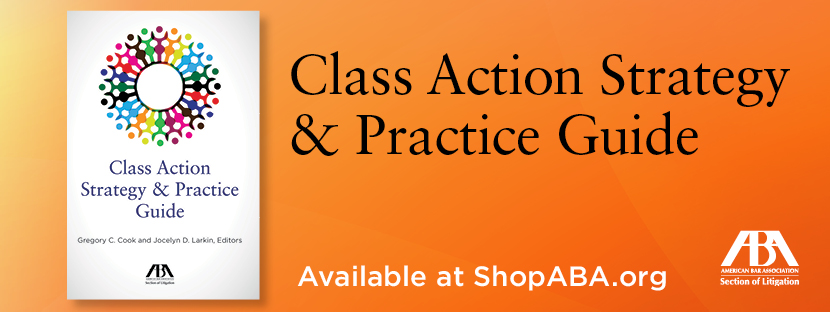
PRACTITIONER BLOG
Read our analyses of developments in Impact Litigation and stay current on class action law

Class Action Strategy and Practice Guide: A Must-Have For All Class Action Attorneys
Class actions involve decisions on strategy at every turn. The positions of the parties are constantly changing and counsel must always be looking ahead and, at the same time, carefully watching their flank. This book helps all practitioners and parties identify, analyze and answer key strategy questions. Ever evolving class action tactics, case law and rule make this insightful practice guide a must read for lawyers, judges, advocates and decision makers at every level.

Toothless Rights: How Forced Arbitration and Class Action Waivers Undermine Civil Rights at Work
Class and collective action empowers those that share the same experiences and injuries to stand together and assert their rights as a group, and they are critical to achieving widespread, systemic change. Class action waivers in mandatory arbitration agreements can erase all of these benefits, requiring employees to pursue their claims through individual arbitration.
But a series of Supreme Court decisions since the early 1980’s has largely sanctioned and accelerated the propagation of forced arbitration, including agreements that prohibit class litigation.

Amendments to Class Action Rule 23 Now in Effect: Objectors Beware!
The amendments to the to the federal class action rule were set to take effect December 1, 2018 subject to Congressional action – rejection, modification, or deferment. That deadline passed without the legislature’s response. As a result, these proposed are now in effect, marking the first substantive update to Rule 23 in fifteen years.

Why “Ascertainability” in Class Actions Matters: How a Kiddie Pool Could Threaten Workers’ Rights in California.
The heightened and burdensome standard for ascertainability articulated by Sotelo and applied in Noel v. Thrifty Payless, Inc. will prevent meritorious employment class actions and undermine workers’ rights. This result is at odds with California’s strong public policies favoring the class mechanism and the robust enforcement of workers’ rights.

A question for Microsoft: How many #MeToo’s does it take?
Sworn statements explained how women at Microsoft are undervalued in comparison to men, are denied opportunities that men receive, are left out of important meetings, and work in a sexualized environment in which male employees stare at women’s breasts, grope them, and comment on their bodies and clothes. One woman explained the pressure that she and other women feel to “hit the sweet spot between being perceived as ‘too timid’ or ‘overly passionate’ and ‘too harsh’ in Microsoft’s male-dominated culture.” Her male manager lowered performance ratings for her and the team of women she supervised because he believed they did not “smile enough.”

SCOTUS Rules on Class Action Tolling in China Agritech, Inc. v. Resh
The Court’s decision, in our opinion, is a grave departure from the goals of efficiency and economy inherent to class actions. Requiring plaintiffs to preemptively file multiple actions unnecessarily burdens the judiciary and clogs the system with duplicative cases. The Court’s decision also is at odds with what we regard as the reality of modern class actions in that many do not have a final decision on class certification within two or four years, for reasons outside the named plaintiff’s control. Necessary discovery, taxed courts, appeals, and recalcitrant defendants all slow the process and often prevent the parties from obtaining a final ruling on class certification within the first few years. In addition, orders denying class certification may identify remediable issues that can be addressed only by filing a new action. This week’s ruling prohibits plaintiffs who initially timely filed their case from filing those new actions if the court’s class certification order arrives outside the original statute of limitations.

Distinguishing Dukes: Another Victory For Employment Discrimination Class Actions
Employers have consistently taken the position that challenges to employment processes that involve some element of subjectivity – and most do – cannot be brought on a class basis after Dukes. According to the logic of this argument, only non-discretionary evaluation measures, such as standardized tests or physical fitness tests, will satisfy commonality under Rule 23(a). Fortunately, a recent opinion from the Southern District of New York joins the growing list of decisions rejecting this extreme position.

SCOTUS Amicus Brief: Class Actions Vital To Equal Opportunity In Employment
A fair workplace, free from discrimination, is an American ideal. Many of our nations F500 companies reflect this value in their forward-facing materials and practices, but sadly, at the contractual level with workers, the promise of an even playing field gets tilted…
That’s why, on August 17, 2017, together with NAACP Legal Defense & Educational Fund and Cohen Milstein Sellers & Toll PLLC, we filed an amicus brief in the U.S. Supreme Court in National Labor Relations Board v. Murphy Oil USA.
Impact Fund Training Institute: A Catalyst For Thoughtful Class Action Justice
For a decade now, the Impact Fund Training Institute has served as a catalyst for thoughtful and thorough class action litigation. Over the past ten years we have trained over 250 attorneys giving them the knowledge and foundation they need to advance justice in the United States. The conference has assisted in bridging the gap between private firms and nonprofit organizations by highlighting opportunities for collaboration.
Institute alumnus, Jacob Bell, sat down with us recently to share his experience and reflect on the value of the training institute to him.
Third Circuit Crystallizes Post-Spokeo Standard
The Third Circuit handed down an opinion last Monday holding that a violation of the Telephone Consumer Protection Act (TCPA) confers Article III standing even in the case of intangible injuries.
The opinion may prove to be less interesting for its impact on TCPA jurisprudence than for guiding courts in their efforts to understand and apply the Supreme Court’s Spokeo decision. After all, within the TCPA context, there already appears to be a consensus that statutory violations satisfy Article III’s requirements.

Good Class Action Notice Boosts Participation and Results in Good Public Policy
While the value of class actions is a hot topic for some, what shouldn’t be a matter of debate is that once a class action is settled, there is only one objective – informing class members of their legal rights and, if class members can get money, clearly telling them how to get it. This is especially true in common fund settlements. It’s not only good for the settlement, its good public policy in general.

H.R. 985: Holding Down Civil Rights Class Actions
121 Civil Rights Non-Profits and 87 Ally Firms Oppose H.R. 985. On February 14, the Impact Fund submitted a letter on behalf of 121 civil rights non-profit organizations and advocates, joined by 87 ally law firms, to oppose H.R. 985 (“Fairness in Class Action Litigation Act of 2017”). H.R. 985, currently pending in the U.S. House of Representatives, would upend decades of settled class action law and undermine the enforcement of U.S. civil rights law.
Class Certification Does Not Require That Class Member Identification Be “Administratively Feasible."
Most people do not retain receipts for the myriad of food items and inexpensive consumer goods that they purchase each year. But, should this entirely understandable fact of modern life provide a license to corporations to defraud consumers who buy these products?
Ninth Circuit: "Fortuitous Non-Injury" Does Not Defeat Class Certification
The recent appellate decision affirming class certification, Ruiz Torres v. Mercer Canyons Inc., No. 15-35615 (9th Cir. Aug. 31, 2016), written by Judge Milan Smith, skillfully addresses the issues of informational injury, non-injured class members, class definition, and aggregate damages while scrupulously declining defendant's invitation to engage the underlying merits.
A Big Year for Class Actions in SCOTUS (2016 Term Review)
The Supreme Court docket this past term had class action practitioners holding their breath. Over the last five years, the Court has limited access to class actions in cases including Wal-Mart Stores, Inc. v. Dukes, AT&T Mobility LLC v. Concepcion, and American Express Co. v. Italian Colors Restaurant. This term, the Court took on an unprecedented four class action cases. The outcome is fascinating and has many ramifications for the ability of class actions to serve as a vehicle for groups of people—including workers, minorities, and consumers—to hold corporations and the government accountable.
Supreme Court of California Approves Common Fund Fees
In a unanimous decision this morning, the California Supreme Court affirmed that attorneys’ fees in a class action may be calculated as a percentage of the common fund created by a settlement or judgment. Laffitte v. Robert Half Int’l, S222996 (August 11, 2016).
In determining the appropriate percentage, the trial court may -- but is not required to – conduct a lodestar cross-check. The trial court also has the discretion, in the first instance, to determine which fee calculation methodology to use (i.e. common fund or lodestar-multiplier) in any particular case. The decision has a useful discussion of the history and criticisms of each method.
TYSON FOODS V. BOUAPHAKEO: HAS THE SKY FALLEN?
Earlier this year, statistics made headlines as the subject of a new Supreme Court decision, Tyson Foods, Inc. v. Bouaphakeo. As Jocelyn Larkin described in her earlier blog post, employees working in the kill, cut, and retrim departments of a Tyson Foods pork processing plant in Iowa alleged that they had not been paid overtime for the time they spent putting on and taking off the protective gear required to do their dangerous jobs. At trial, the employees relied on “representative evidence” to prove liability – an observational study that resulted in an estimated average “donning and doffing” time for each department. A jury awarded the class of employees about $2.9 million in unpaid wages.
The Supreme Court accepted Tyson’s appeal and agreed to consider two questions:
An Insider's Guide To The Impact Fund Class Action Training Institute
Last October, shortly after I joined the Impact Fund as its Litigation Fellow, I had the opportunity to attend the Impact Fund’s Training Institute in Chicago. Having had some exposure to class action litigation during my clerkship, but no experience actually litigating a class action, I had a lot to learn and was excited to dive in and learn as much as I could over the course of the training.
Cy Près 101
In modern litigation, the term “cy près” refers to the act of designating unclaimed class funds to public interest organizations whose work furthers the interests of the class and is tied to the purpose of the litigation. But the concept of cy près originated long ago in the law of charitable trusts in courts of equity. Today, cy près is generally used only after class funds have been distributed to class members, but it has become impossible or impracticable to distribute some remaining portion of the class funds, such as in the following situations:
Economic Justice: Resisting Zombie Claims by SSA
Imagine receiving a notice from the IRS that your long-awaited tax refund has been withheld by the Social Security Administration (“SSA”) because you were once paid Social Security benefits and SSA has identified a benefit overpayment that occurred over a decade ago — or one of your parents was once paid Social Security benefits on your behalf over a decade ago and SSA identified an overpayment. If the withheld amount was $2,100, would you go out and find an attorney to represent you in an individual case against the SSA?
